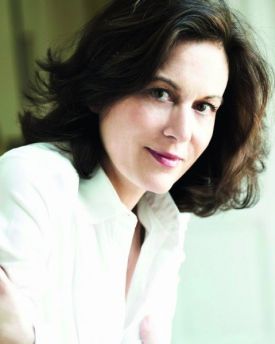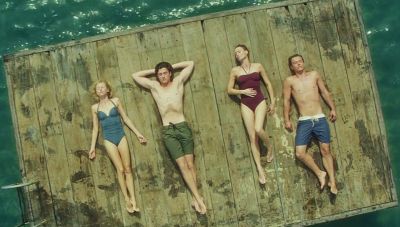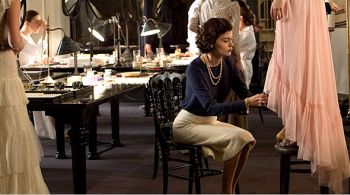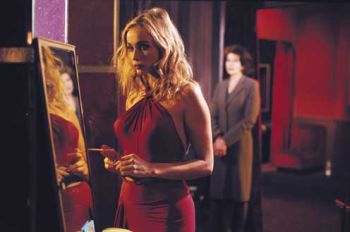By Anna Weinstein.
French filmmaker Anne Fontaine has written and directed fourteen films since her debut in 1993. Her films, Dry Cleaning (1997), How I Killed My Father (2001), and Coco Before Chanel (2009) brought her international attention as a writer-director, and her film Nathalie (2003) was adapted into Atom Egoyan’s widely released Chloe (2009), starring Julianne Moore, Amanda Seyfried, and Liam Neeson. Her film Adore (2013), which she adapted from Doris Lessing’s novella of the same name (included in the author’s 2003 collection The Grandmothers), starred Naomi Watts and Robin Wright and premiered at Sundance 2013 under the title Two Mothers. Fontaine spoke with Anna Weinstein about moving to France to dance professionally as a teenager, her process in creating film stories, and the types of characters she likes to explore in her films.
How did you get your start as a director?
 I was acting in a film, working for a director – this was after I was dancing – and my director suggested that I had an ear for dialogue. That was the start of my writing then. I wrote a script, very personal to me, and he gave me the encouragement that I could be the person to direct the film as well.
I was acting in a film, working for a director – this was after I was dancing – and my director suggested that I had an ear for dialogue. That was the start of my writing then. I wrote a script, very personal to me, and he gave me the encouragement that I could be the person to direct the film as well.
What was the timing on that? How much time from when you first started writing to when you started shooting?
Oh, it was a long time – I think three or four years. I don’t remember exactly, because I had to work to make money, to live, you know – so I think it was three years before I was able to make the film. It seems like a long time to me now.
Where do you think your drive came from – your discipline to stick with the project for so long?
From my dancing, I would say. Every day you have to make this effort, more and more each day. But for me it was a personal story as well, the script – more or less, of course. And I thought it was the only way I could…not save myself, but it was something really important. It was my life inside of me. I was always thinking about the characters and the situations. The script was another life, a life that I preferred to my actual life, and I think I knew I was better off to imagine things, to create things, than to live day by day.
So that desire to continue living in the world of your story, it allowed you to keep persisting, to not give up?
It helps me to have that mindset, not to stop, not to say, now I quit. Because of course you meet people who say you aren’t able to do it, it’s too difficult, you don’t have the money, you don’t have what it takes. And you have to say to yourself, maybe this person doesn’t believe in me, but I will be able to do it. I think someone’s determination, it’s very personal. For me, I was alone in Paris at sixteen years old, without a family, so determination is a part of me.
What brought you to Paris?
It was a complicated story. A need to be away from my family and also a thought that I had to move away from Portugal. But also because I wanted to do modern ballet, and in Portugal it was more classical. It was to have a new life in Paris. But I was alone at the time.
That’s very young, sixteen. Did you have siblings?
Yes, they stayed in Portugal. But I am the oldest. I felt that I had to move. At thirteen, fourteen, I felt I had to be in France, to be in another world, to dream in another way. If things become too difficult, you are used to this difficulty. It’s a good training to do film.
Do you find that stories are a safe place to explore subject matter that you’re grappling with on a personal level?
Yes, I always felt that for me to do a movie it has to be connected by something personal. I couldn’t direct a movie if I didn’t feel something. It doesn’t mean it’s entirely true to my life, but yes, it’s true to a feeling of something fitting in that moment. Why I decide to say yes to a story or to imagine a story completely, it’s my way to work with the characters, maybe to help them, I don’t know.
As a woman, do you feel any responsibility for how you portray your female characters?
No, I think to be intelligent, with ability, exploring something about the human condition, but I don’t feel because I am a woman that I’m more responsible for women characters. Not at all for me. What’s important for me is to have the dimension of character, the opacity, the mystery, the things you can’t explain but can feel – a complicated, complex character. That interests me, because it’s a human being.
For me, this is true of every character I put in front of the camera. Of course, I’ve made movies with very strong female characters – Coco Chanel, Doris Lessing’s Perfect Mothers, but what attracted me to these women is that they aren’t conventional. They aren’t operating with morals in mind. They aren’t immoral either, but they’re operating from their point of view. I don’t like it when there’s a moral point of view in a film. I like to explore a moment in time when the character isn’t used to that moment and how that can change the way she lives, the way she feels. I always like to work with characters that try to advance their life, not to follow their life. That’s something very interesting in a movie to me – for characters not to follow the program of their life, because everybody has that kind of program.
Your films often seem to circle discussions of gender and sexuality. Is that a conversation you like to have, about the blurred lines between masculinity and femininity?
Yes, because to be a director, it’s a way to be almost transsexual, to be inside both sexes. And for me, it’s interesting to work out this ambiguity in my films. I don’t believe we have only one way to be sexual. I don’t believe in that. It’s society that makes you believe that, of course. But this division can escape you sometimes when you meet somebody different, and it’s interesting to explore this thing that you can’t describe, to explore it in a story. It’s an unconscious desire, I believe, because the desire is something very strange – why you desire this certain person at this moment of your life. It’s strange, and I do like the atmosphere you can create in a film where the characters are going in a certain direction, but they don’t know where they’re going. This is something I find myself attracted to in stories.
Is it a challenge to be female filmmaker in France? Do you think your gender has any relevance in your filmmaking?
I never think about being a woman director. In France, of course there are not so many female directors as there are male, but I don’t think about it. When some women’s festival wants to present a movie of mine, I say no. I don’t want to go to a female festival. It doesn’t mean anything to me. For me, it’s the personality of the director, not the gender. Sometimes a man can speak about women better than a woman.
Everybody asks me the question, because it’s something rare and not so easy. It’s a space where the machismo of the crews and the producers makes an impact – it’s not equal. But in France, nobody can tell you today, oh, I’m suffering because I am a woman director. I think it’s a plus, because the producers like that we have another angle to speak about sexuality, to speak about men, of course. So it’s really not a problem in France, not at all. I’m lucky to be in France for that.
Your producers and the people you work with, is it a mixed crew, a mix of men and women, or more women, more men?
Yes, the last film I just finished in Poland, for example, I took a DP who is a woman. I had thirty-five crew members who were women. But I couldn’t do a movie with only women. I think it would be difficult. I like to have both, like a balance. Not to be half and half, because I’m not half and half. I’m more close intellectually sometimes with men, I think. But we have very good female technicians in France now – in sound, in image, great technicians. That was for men before, the technicians, but now there are younger DPs who are women, really amazing.
How much downtime do you give yourself? I’m curious about your work-life balance.
For me, it’s freedom to work. I work the maximum I can. I am finishing a movie now, and I’m doing a new script for the next one, and another script for the next-next one. I like to have two or three things in my mind, and I need to keep developing stories after I’m done shooting. Because the most difficult part is the shooting. That’s really hell and war. And if you can have the new stories to turn to, the imagination and the energy to go there… at this moment I try to save my energy to invent new things.
But every day I begin with dance, one hour each morning. I do a classic ballet and barre. So I begin like that, and then I can concentrate on a story.
And concentrating on story, is that you sitting at a computer all day? What does your writing routine look like?
No, not at a computer. I do it with my scriptwriter. I speak, and he works with the computer. And after that, I read and rewrite. I don’t want to do it myself at the computer. I want to be free and want to work with words that don’t always come from me, because if it comes from me, I have more difficulty putting distance between it. I need a scriptwriter to write it. But I do all the scenes, speaking the sentences.
The scriptwriter, how often do you work with the same person?
It depends on the story. I worked for two or three movies with the same scriptwriter, and now I’m trying somebody new. I like not to be too comfortable. It’s good to have new blood also – and it depends on the tune of the script that you’re working on.
What happens if you’re too comfortable? How does that affect your art?
For me, it’s not possible to be comfortable. I don’t know what it is, but I feel that to improve, to be really fresh, you have to be fragile. For example, when I was in Poland with a Polish crew, on location outside in the woods, in this moment I was fragile, and I had to find another way to do things
It’s so difficult to do a movie, because you don’t have protection when you’re shooting – it can be very violent and very difficult. You can be depressed. And when you have fourteen hours a day, six days a week, trying to find the things you need for the film to work, and sometimes you’re not finding these things. You’re fighting yourself really. It’s complicated, something very lonely in a way, but with many people around looking at you, watching what you’re doing. And they’re helping you, of course.
So the shoot: is that your least favorite part of making a film, or is it just the most difficult part?
The most difficult. The shooting is more violent. It’s really something difficult physically, and psychologically. Yes, I find sometimes that it’s worse than other experiences. It depends, but I always feel completely down at the end, like I’m a ghost.
Are you relieved at all, or is it a letdown when it’s done?
When it’s done I think it’s a miracle. I’m not dead, nobody died. Really, I always pray like it’s a miracle.
Do you have a favorite film that you directed?
I don’t know. I never look at them anymore. When they’re done, they’re done. It’s good to have the adventure. It’s like love. You’re not always going to love the same kind of people. You’re going to love somebody that makes your life different. And with films, it’s also like that – it’s a love affair. But I try not to look back.
The Diva Directors interview series has appeared both online and in the print editions of Film International. To date, the series has included interviews with internationally acclaimed filmmakers Gillian Armstrong (Australia), Susanne Bier (Denmark), Isabel Coixet (Spain), Cristina Comencini (Italy), Marleen Gorris (The Netherlands), Caroline Link (Germany), Claudia Llosa (Peru), Sharmeen Obaid Chinoy (Pakistan), and Kirsten Sheridan (Ireland).
Anna Weinstein is a frequent contributor to Film International.





